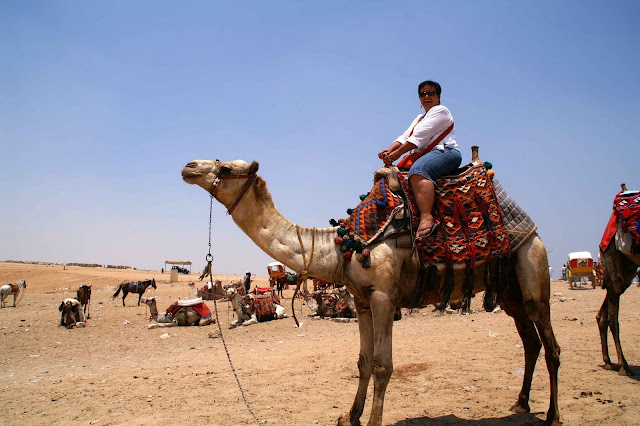Walking
amongst the 5000 year old structures of the Giza Plateau is truly a
humbling experience. This ancient burial ground of the great pharaohs of
ancient Egypt have stood the test of time and truly the last remaining
Seven Wonders of the Ancient World.
The
massive Great Pyramid stands almost 760 feet tall and was the tallest
structure in the world until the 19 century. This monument to the
Pharaoh Korfu is estimated to contain over two million blocks weighing
an average of 2.5 tonnes is an engineering masterpiece. Next to this
pyramid is the pyramid of Khafre son of Khofu, slightly smaller but
still has some of the polished limestone at the apex of the pyramid.
Flanked by a smaller one for the grandson of Khofu, Menkaure. We were
fortunate enough to be able to enter the Pyramid of Khafre and climb
through a narrow shaft to the burial chamber in the center of this solid
stone structure. The entire Giza Plateau area is covered with smaller
monuments and tombs dedicated to the wives of the three great pharaohs
for whom they were built. But most notable is the amazing Sphinx, which
is the earliest known monument of sculpture in ancient Egypt. And of
course our visit to this amazing land of Egypt would not be complete
without a camel ride around the pyramids.
We also ventured to the area called Saqqara, which is one of the richest archaeological sites in all of Egypt to visit the amazing step pyramid. This step pyramid was built for the ruler King Dojeser in 27 century BC.
After
a chaotic road trip through the maniac streets of Cairo we made our way
to the train station and boarded an overnight train down the Nile to
Aswan. We soon discovered that an overnight sleeper train in Egypt is
much different that the ones in Europe. But it was a great adventure and
we arrived safe and sound and to our tour guide’s surprise even on
time.
In
Aswan we checked into our floating hotel SemiRamses 1, a first class
Nile river boat with views from every room and an amazing roof top deck
with a pool. This is to be hour home for the next four days, life is
tough.
Aswan
is Egypt’s southern most city and situated at the base of the two great
dams of the Nile, the Aswan Dam and the High Dam (3rd largest in the
world). The smaller dam the Aswan dam built in 1902 and the much larger
High Dam was built in 1971 were built to regulate the flow of the Nile
to control the annual floods and provide the country with power. These
two great dams created the massive Lake Nasser which reaches far into
the Sudan, but flooded great historical sites in its making.
One
of these historical sites was the Temple of Philae, which was moved in
its entirety just prior to the opening of the dams to a new location 200
meters to the east on higher ground. This massive temple dedicated to
the cult of Isis has both Ancient Egyptian and Roman-Greco influences,
with massive columns built around a pylon styled temple. Here we
explored through the site and viewed the countless hieroglyphs, viewed
the delicate carved sandstone walls and stood in awe at the colors still
visible on some of the carvings.
The land between Aswan and the country of Sudan is the land of the
Nubian people. Here were fortunate enough to have visited a Nubian
village with its brightly colored homes and camels on the streets. We
spent some time inside a Nubian home with its stuffed crocodile over the
door, sand floor and of course the pet baby crocodiles in the middle of
the house. We had tea, smoked a sheesha, got tattoos and held the
crocodile. And the day ended with a cruise down the Nile on the roof of a
small boat at sunset, viewing the palm trees and sand dunes reach down
to this great river, could life get any better.
And
life did get better, the next day we were at the amazing temple of Abu
Simbel at sunrise. After a 3:30 wake-up call we were on a 5:00 am #flight
to the southernmost point of Lake Nasser, to view the sunrise over the
dessert. The early rise was well worth it as the massive statues at the
entrance to the Temple are breathtaking. The great Temple of Abu Simbel
and the smaller Temple of Hathor were built to honor Ramses II and his
wife Nefertari in 13 BC. The four large colossal statues of Ramses
seated in different stages of his life create the facade to an amazing
temple. This temple and adjoining mountain had to be moved for the
creation of the High Dam and the entire site was moved in 1960 to higher
ground. This Temple was designed to impress as well as frighten the
enemies coming up the Nile into Egypt, and it is still doing that today.






















Comments
Post a Comment